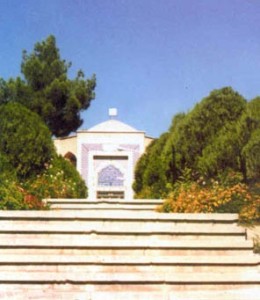Hazrat Sayyidinā Alī bin Ahmad Khwājā Abul Hasan Kharaqānī quddis sirruhū(352-425 AH) was one of the greatest Sufi masters ever born. He was a spiritual student of Sultān al-Ārifīn Khwājā Bāyazīd Bastāmī, though he was born in 325 AH (963 CE), 64 years after the death of Sayyidinā Bastāmī (d. 261 AH).

Shrine of Hazrat Abul Hasan Kharaqani
Numerous Sufi masters benefited from him, and two of his khulafā (deputies) are the following:
- Khwājā Abū Alī Fārmadī (d. 477 AH / 1084 CE)
- Khwājā Abdullāh Ansārī (d. 481 AH / 1088 CE)
Khwājā Abdullāh Ansārī used to say
“In the science of Hadīth and Shariā, I have many teachers, but my master in Tasawwuf and Haqīqah is Shaykh Abul Hasan Kharaqānī. If I had not visited him, how would I have learned the Reality?”
Shaykh Kharaqānī had written this on the door of his khānaqāh:
Whoever comes to this house, feed him and do not question him about his faith. For whoever is given life by Allah, deserves to eat from the table of Abul Hasan.
This great luminary Sufi master passed away on 10th Muharram 425 AH (5/6 December 1033 CE). His holy shrine and final resting place is located in Kharaqān situated in Semnan province, Iran.
He had few sons, two of whom were named Hasan and Ahmad.
The next in the Naqshbandī Mujaddidī Tāhirī spiritual golden chain is Shaykh Abul-Qāsim Gurgānī.
Related Books and links
- Nūr ul-Ulūm min Kalām Shaykh Abul Hasan Kharaqānī (Persian), originally written in the shaykh’s lifetime and later updated after his death. The only known manuscript is in British Museum London. Urdu translation has been published (see following) and includes the images of the original manuscript. This mostly contains speeches (Malfūzāt) of the shaykh.
- Tazkirah Qutb-e-Ālam Hazrat Khwājā Abul Hasan Kharqānī (Urdu) by Muhammad Nazīr Rānjhā, 2005. (260 pages). A complete biography of the shaykh. Also includes Urdu translation of the above book and images of the original London manuscript.
- A video containing pictures of the shrine of Hazrat Abul Hasan Kharaqānī